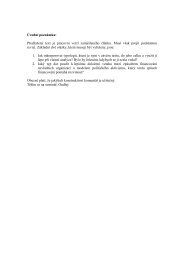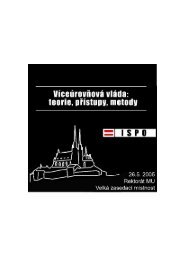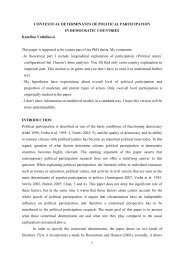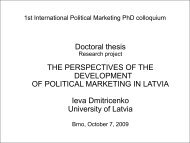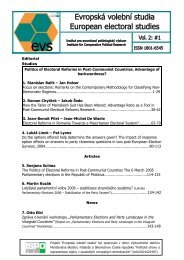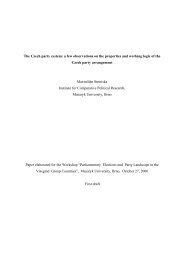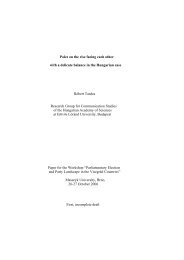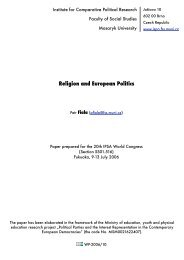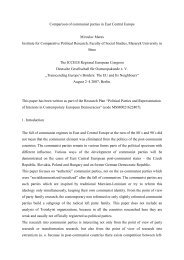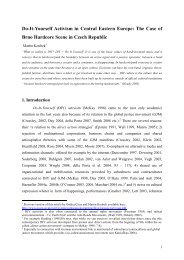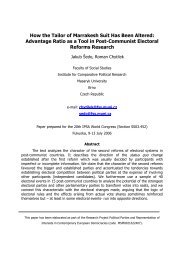Agrarian and Peasant Parties in the Czech Republic - Masarykova ...
Agrarian and Peasant Parties in the Czech Republic - Masarykova ...
Agrarian and Peasant Parties in the Czech Republic - Masarykova ...
Create successful ePaper yourself
Turn your PDF publications into a flip-book with our unique Google optimized e-Paper software.
a) 1990-1991 – <strong>in</strong> <strong>the</strong> early months after <strong>the</strong> regime change <strong>the</strong>re serious chances it may be<br />
possible to re<strong>in</strong>troduce agrarian parties (or agrarian party family for that matter) as relevant<br />
segment of <strong>the</strong> party system; <strong>the</strong>se hopes seemed to be confirmed by electoral results<br />
b) 1991-1992 – s<strong>in</strong>ce <strong>the</strong> first half of 1991 parties represent<strong>in</strong>g agrarian <strong>in</strong>terests (primarily <strong>the</strong><br />
<strong>Agrarian</strong> Party /Zem$d$lská strana – ZS/) kept try<strong>in</strong>g to present <strong>the</strong>mselves as part of broader<br />
political area, focused on predom<strong>in</strong>antly regional <strong>and</strong> environmental issues <strong>in</strong> general, <strong>and</strong><br />
became major element <strong>in</strong> a coalition called Liberal-Social Union (Liberáln$-sociální unie – LSU)<br />
c) 1992-1996 – period of gradual decl<strong>in</strong>e of relevance of agrarian parties, related to several general<br />
developments <strong>in</strong> <strong>the</strong> <strong>Czech</strong> party system <strong>and</strong> some o<strong>the</strong>r factors mentioned above, namely low<br />
numbers of voters who have perceived agrarian parties as best mediators of <strong>the</strong>ir <strong>in</strong>terests<br />
d) after 1996 – failure <strong>in</strong> 1996 election marks an end of any real aspirations to present parties<br />
represent<strong>in</strong>g agrarian <strong>in</strong>terests as relevant part of <strong>the</strong> <strong>Czech</strong> party system; consequently, s<strong>in</strong>ce this<br />
year agrarian parties as relevant actors have disappeared<br />
Follow<strong>in</strong>g this division <strong>in</strong>to major stages, we can analyze <strong>the</strong>ir respective details <strong>and</strong> see most<br />
important reasons of marg<strong>in</strong>al position of all <strong>Czech</strong> agrarian parties.<br />
In <strong>the</strong> first months after <strong>the</strong> regime change <strong>in</strong> November 1989 it seemed <strong>the</strong>re might be a<br />
relevant potential for parties defend<strong>in</strong>g <strong>in</strong>terest of those who are related to agriculture – between<br />
December 1989 <strong>and</strong> March 1990 we could have witnessed establishment of seven parties that<br />
declared <strong>the</strong>ir determ<strong>in</strong>acy to act as representatives of <strong>the</strong> <strong>Czech</strong> countryside. From h<strong>in</strong>dsight we<br />
can say by far <strong>the</strong> most important of <strong>the</strong>se parties was <strong>the</strong> <strong>Czech</strong>oslovak <strong>Agrarian</strong> Party<br />
(#eskoslovenská strana zem$d$lská – #SSZ), which was founded <strong>in</strong> January 13, 1990, <strong>and</strong> which<br />
<strong>in</strong>tended to offer broadly conceived representation of all voters that are <strong>in</strong> any way related to <strong>the</strong><br />
countryside <strong>and</strong> agriculture. Despite this self-identification <strong>the</strong> party was understood as a political<br />
expression of <strong>in</strong>terests of co-operative farm<strong>in</strong>g (Mareš, Pšeja 2005: 1605-6). However, such a<br />
label should have been more appropriate for ano<strong>the</strong>r party – Political Movement of Agricultural<br />
Cooperatives’ Members, which was founded <strong>in</strong> March 1990 to defend <strong>in</strong>terests of a particular<br />
segment of agricultural workers. Besides <strong>the</strong>se two parties <strong>the</strong>re were five more parties<br />
subscrib<strong>in</strong>g to rural issues <strong>and</strong> countryside <strong>in</strong> general – <strong>Republic</strong>an Party of <strong>Czech</strong>oslovakian<br />
Countryside (Republikánská strana !eskoslovenského venkova /RS#V/), <strong>Agrarian</strong> Party of <strong>the</strong><br />
Civic Forum (from December 1989 till March 1990 called <strong>Czech</strong>oslovakian Urban <strong>and</strong> Rural<br />
<strong>Agrarian</strong> Party /#eskoslovenská strana zem$d$lská m$st a venkova – #SZMV/), Free <strong>Peasant</strong>s’<br />
Party (Svobodná rolnická strana /SRS/), Party of <strong>the</strong> <strong>Czech</strong> Countryside (Strana !eského<br />
venkova /S#V/) <strong>and</strong> f<strong>in</strong>ally Party of Moravian Countryside (Strana moravského venkova<br />
6



